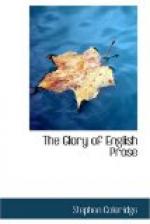“To affirm that the judgment of a nation is erroneous may mortify, but to affirm that her judgment against is for; to assert that she has said ay when she has pronounced no; to affect to refer a great question to the people; finding the sense of the people, like that of the parliament, against the question, to force the question; to affirm the sense of the people to be for the question; to affirm that the question is persisted in, because the sense of the people is for it; to make the falsification of the country’s sentiments the foundation of her ruin, and the ground of the Union; to affirm that her parliament, constitution, liberty, honour, property, are taken away by her own authority,—there is, in such artifice, an effrontery, a hardihood, an insensibility, that can best be answered by sensations of astonishment and disgust, excited on this occasion by the British minister, whether he speaks in gross and total ignorance of the truth, or in shameless and supreme contempt for it.
“The constitution may be for a time so lost; the character of the country cannot be so lost. The ministers of the Crown will, or may, perhaps, at length find that it is not so easy to put down for ever an ancient and respectable nation, by abilities, however great, and by power and by corruption, however irresistible; liberty may repair her golden beams, and with redoubled heat animate the country; the cry of loyalty will not long continue against the principles of liberty; loyalty is a noble, a judicious, and a capacious principle; but in these countries loyalty, distinct from liberty, is corruption, not loyalty.
“The cry of the connexion will not, in the end, avail against the principles of liberty. Connexion is a wise and a profound policy; but connexion without an Irish Parliament is connexion without its own principle, without analogy of condition; without the pride of honour that should attend it; is innovation, is peril, is subjugation—not connexion.
“The cry of the connexion
will not, in the end, avail against the
principle of liberty.
“Identification is a solid and imperial maxim, necessary for the preservation of freedom, necessary for that of empire; but, without union of hearts—with a separate government, and without a separate parliament, identification is extinction, is dishonour, is conquest—not identification.
“Yet I do not give up the country—I see her in a swoon, but she is not dead—though in her tomb she lies helpless and motionless, still there is on her lips a spirit of life, and on her cheeks a glow of beauty—
“Thou art
not conquered; beauty’s ensign yet
Is crimson in
thy lips, and in thy cheeks,
And death’s
pale flag is not advanced there.”




